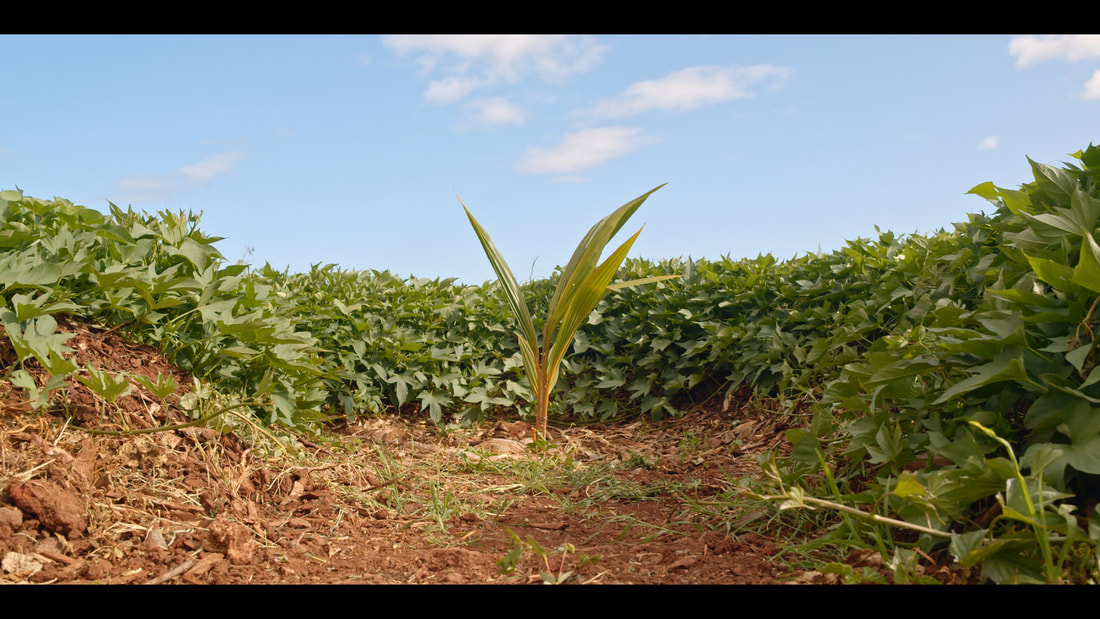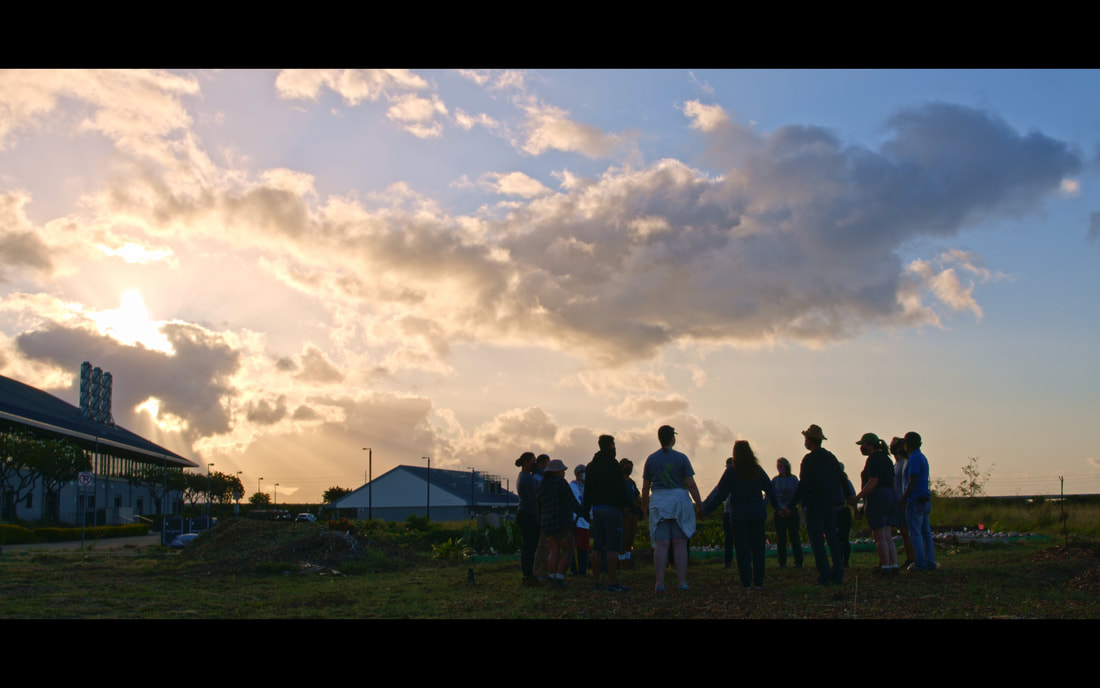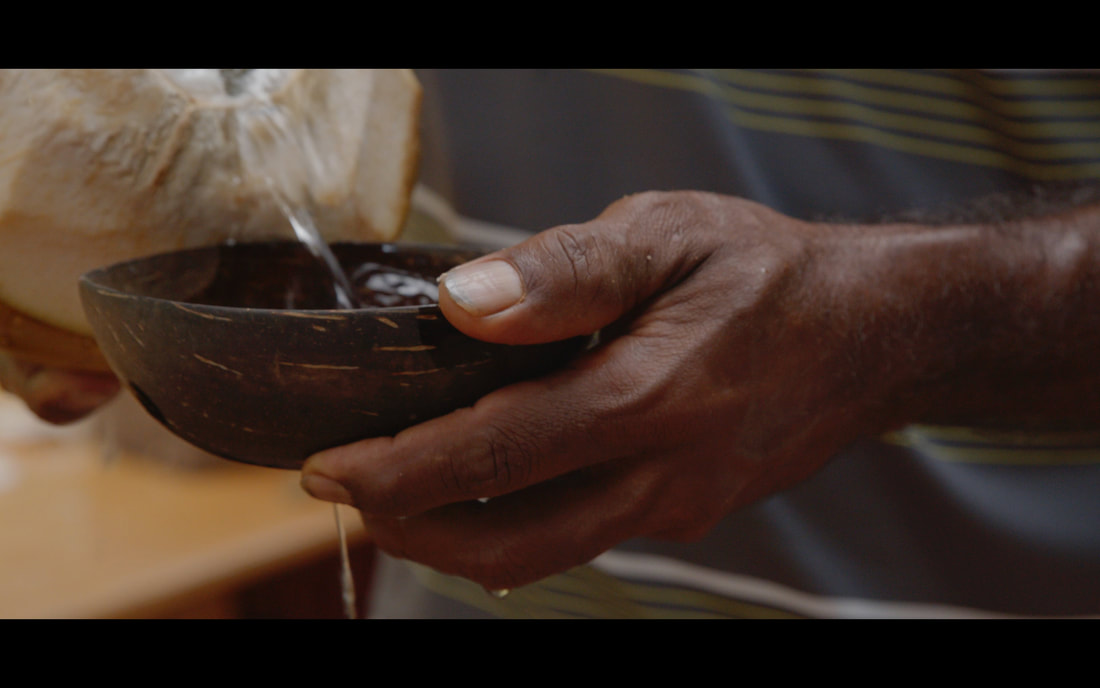|
Q: What inspired this story? This project began as part of a series of videos I pitched to the National Association of State Foresters (NASF) which we call “Tree Stories.” The series aims to spark interest in trees and forests by telling human-centered stories about how different trees profoundly affect people’s lives across the United States. We were initially pointed in the direction of “Niu Now” (the coconut-planting movement this film is about) by Heather McMillan from the one of NASF’s partners, the Hawaii Department of Land and Natural Resources. I got on Zoom with Aunty Manulani Aluli Meyer and Indrajit Gunasekera (the main subjects of “Kumu Niu”) and I knew right away I was bearing witness to something really special, something I believed could change the world. I asked them if I could help spread their work and their message through a film and was overjoyed when they agreed! Q: Describe some of the challenges faced while making this film/program. There were moments when it was difficult to capture what we wanted only being a crew of only two. But by the same token there were many times when a larger crew would have made the intimacy of the experience impossible, and I think that would have detracted from what we were hoping to communicate about this work to an audience. So, yes, sometimes filmmaking is hard! And you always feel like you could use more resources. But I think it all happens as it should and I wouldn’t change anything if we could go back and do it again. Q: What did you learn from your experience making this film/program? I think for a lot of us who are conscious of and concerned about the health and safety of all forms of life on our planet, it can be really overwhelming to approach the question, “What can I do about it?” One (of the innumerable) lessons I learned from spending time with Aunty Manu and Indrajit is the value of going deep with your efforts, as opposed to wide. The amount of love and thought and care that has been put into the nurturing of every seedling you see in “Kumu Niu” has a profound effect on the plants themselves and on the people who work with them. These effects reverberate through everyone who interacts with those trees and those people over the course of their lifetimes. The joy of Niu Now is apparent in all the work that they do, and it begets itself as the movement grows. It has changed me for sure over the past couple years, and I hope to carry that spirit through all of my filmmaking and storytelling endeavors in years to come. I am beyond grateful for this. Q: How do you approach storytelling? Most of my documentary work has been focused around people. In this context I see myself as a tool. My goal is to use my technical skills to help communicate other people’s stories in a way that feels truthful to them, never to invent or push a story that I think will appeal to viewers. Ultimately, Truth is universal, and when people have a venue to speak their own truths in their own words, I think that is when viewers connect with someone else’s story the most. And hopefully they feel something and they learn something. Q: What impact do you hope this film/program will have? My first hope for “Kumu Niu” is that it amplifies the message of Niu Now and spreads the joy and the wisdom of aloha `āina, which is, as Aunty Manu describes it, “loving land and serving people.” In short, I hope it inspires people to take interest in the land on which they live and rely, and ignites them to foster a true relationship with it. My second hope for the film is that it returns energy back to the Niu Now movement, which has continued to flourish since our filming in early 2021. There is still much work to do to restore the niu to its proper place as a respected teacher and a sustainable, local source of food throughout much of the tropical world. Q: What's next? I continue to be in touch with Aunty Manu and Indrajit about their ongoing work. They have planted several more niu groves and new nurseries since I was there in April, 2021, and Indrajit has ambitions to return to his homeland in Southern Sri Lanka at some point to do more planting and work to protect the knowledge of the coconut in his own culture. and I personally hope the opportunity arises to film with them again, only if and when it will prove useful to their goals. In the meantime, my eyes are peeled for more truths to tell about how we can practice love and care for our planet and each other. Kumu Niu won the 2022 Jackson Wild Media Award for Human Planet - Short Form. Follow along with Quick Act Casual Productions and the National Association of State Foresters on Instagram.
4 Comments
6/22/2023 09:45:34 am
I think the story of that one is great. Want to watch that one.
Reply
10/9/2023 05:20:16 am
I have been exploring for a touch for any high-quality articles or blog posts like this.
Reply
2/12/2024 03:39:20 am
Your points are well articulated and contribute significantly to the discussion.
Reply
Leave a Reply. |
Archives
March 2024
Categories
All
|
Contact UsJackson Wild
240 S. Glenwood, Suite 102 PO Box 3940 Jackson, WY 83001 307-200-3286 info@jacksonwild.org |




 RSS Feed
RSS Feed